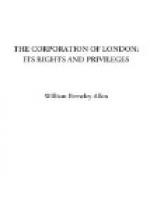mystery. These companies were not all equally
regarded by either the sovereign or the citizens.
Towards the close of the reign of Edward II. the
more important companies separated from the less wealthy;
and this distinction was soon so far recognized, that
precedency was given to the following twelve companies:-
1. Mercers; 2. Grocers; 3. Drapers;
4. Fishmongers; 5. Goldsmiths; 6.
Skinners; 7. Merchant Tailors; 8. Haberdashers;
9. Salters; 10. Ironmongers; 11.
Vintners; 12. Cloth workers. In these companies
the freemen from early times have been of two classes;
the upper, entitled to wear the “livery”
or uniform of the company; and the lower, consisting
mostly of workmen. The representatives of the
companies were chosen from the former, and are mentioned
in the charters as probi homines. In the fifteenth
year of Edward IV. the Common Council enacted, that
the masters, wardens, and probi homines of the several
mysteries should repair to the Guildhall in their last
liveries, for the purpose of electing the Lord Mayor,
sheriffs, and other civic officers; and that the members
of the Common Council should be the only other persons
present. This court now consists of the Lord
Mayor or his deputy—an alderman who has
passed the chair—four aldermen, and the
liverymen of the companies who are also freemen.
Their office is to elect the Lord Mayor, sheriffs,
chamberlain, bridge-master, and auditors of the City
and Bridge-house accounts, and the four ale-conners.
The official style of the court is, “A Meeting
or Assembly of the Mayor, Aldermen, and Liverymen
of the several Companies of the City of London in
Common Hall assembled.” The franchise is
confined to liverymen of a year’s standing,
who have paid their livery fines in full, without
receiving any drawback or allowance. The mode
of proceeding is by a show of hands, but a poll may
be demanded by any of the candidates, or by two electors.
The Sheriffs.
The office of Sheriff has somewhat fallen from its
ancient “high estate.” According
to Stow, they were formerly “the mayor’s
eyes, seeing and supporting part of the case, which
the person of the mayor is not alone sufficient to
bear.” In olden times the sheriffs were
always conjoined with the mayor and aldermen in proclamations
requiring them to preserve the peace of the City.
From a very remote period the right of electing these
officers belonged to the citizens, and later charters
acknowledge and confirm the privilege. Henry
I. granted to them to hold Middlesex to farm, for
300 pounds a year, and to appoint their own sheriff;
while the second charter of John confirms to them
the sheriffwick of London and Middlesex at the rent
or farm of 300 pounds, “blank sterling money,”
and declares that they “shall make amongst themselves
sheriffs whom they will, and remove them when they
will.” In those times this was a very important
privilege, for the sheriff, or shire-reve, as the
king’s bailiff, was possessed of extraordinary




